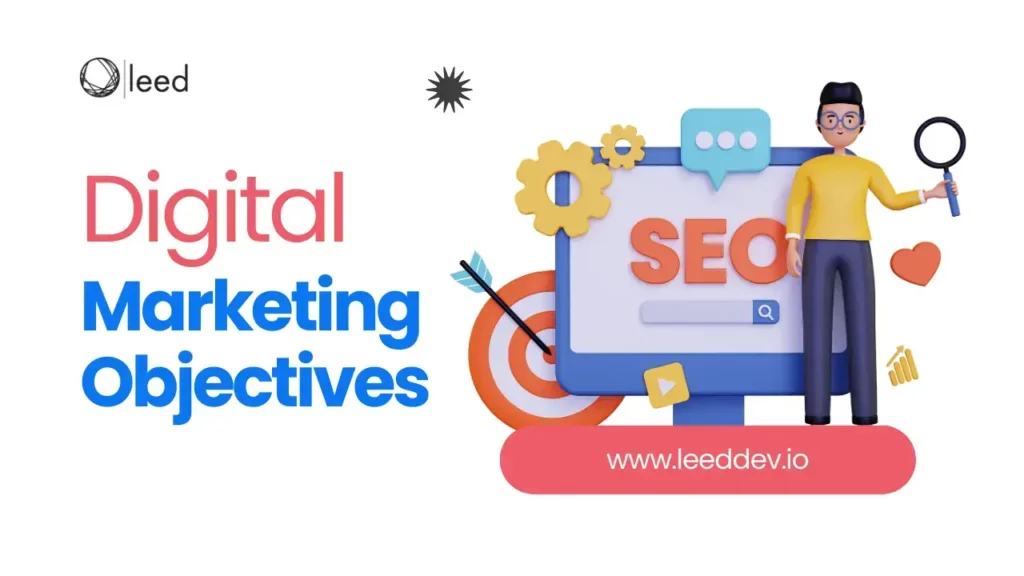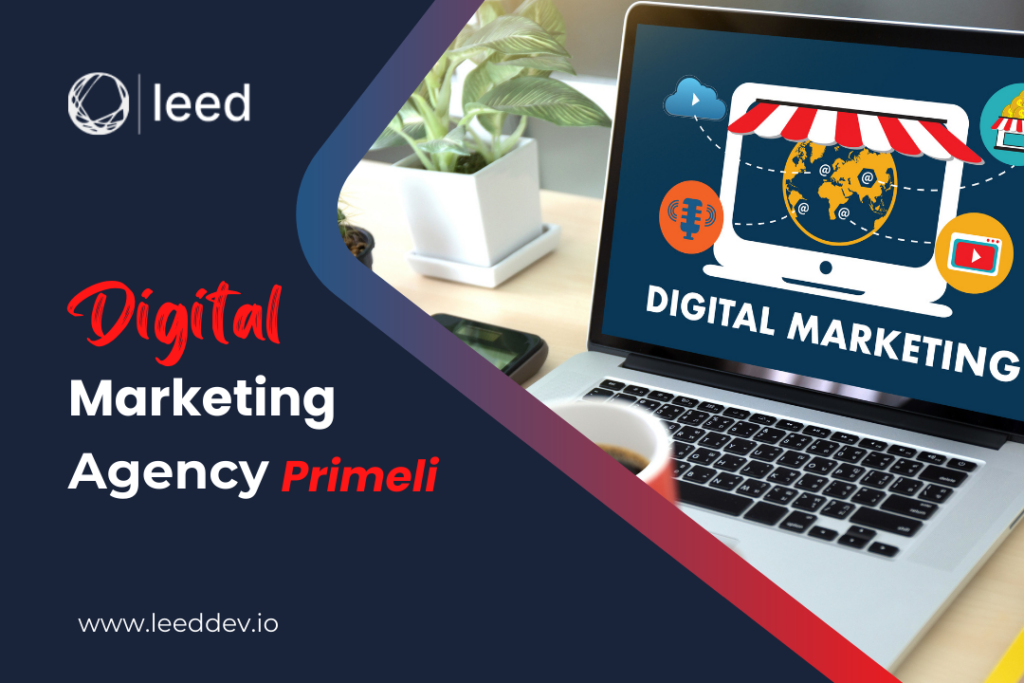Digital marketing is a targeted approach that is used by brands to promote their businesses or their services. They use the power of different digital platforms, like websites, emails, and social media, to connect with all clients and make long-term relationships with them.
As businesses promote their products and services across various digital platforms, each organization has specific goals it aims to achieve. The most common objectives of digital marketing include generating qualified leads, increasing brand awareness, attracting new customers, driving traffic to the website, and enhancing overall brand visibility and engagement.
As a small business owner, contractor, or advertiser are you worried about why your digital promoting efforts are not conveying the outcomes you want? You’ve also invested lots of money in running campaigns, boosted web based entertainment posts and sent endless messages but still not getting results? Well the issue lies in your digital marketing objectives.
At Leed Software Development we provide detailed information about the Digital Marketing Objectives. From this article, you will learn the main objectives of digital marketing including their importance, goals, and various examples.
What are Digital Marketing Objectives?
Objectives of digital marketing are the outcomes and targets that marketers and their teams try to achieve through various strategies and social media. Some examples of digital marketing are increasing market share, improving ROI, and increasing sales, and so on.
Also Read: Social Media Marketing for Small Business: Boost Growth 2025
Importance of Digital Marketing Objectives
These are some important digital marketing objectives that you can use in your business for better improvement:
- Worldwide Reach: Digital marketing enables businesses the ability to reach a worldwide audience, breaking geographical boundaries.
- Cost-Effective: It offers cost-efficient promotion as compared with old strategies, allowing for better budget share.
- Targeted Advertising: Accurate focus on the options for reaching the right audience and expanding conversion rates.
- Measurable Results: Digital marketing gives continuous analysis, allowing quick estimates of investment rates of campaign performance.
- Customization: Custom-made content and customized campaigns improve client engagement and satisfaction.
- Brand Creation: A logical digital appearance helps to create a strong brand identity and reputation.
- Higher ROI: Successful strategies give more profit in returns on investment and expanded income.
- 24/7 Accessibility: Online presence guarantees that the organizations are available for the clients continuously.
- Interactivity: Engaging content and two-way communication promote long-term client connections.
- Flexibility: Digital marketing allows quick adaptation to changing business as with the market trends and also with the client desires.
Top 10 Digital Marketing Objectives for Businesses Success
Digital marketing objectives are based on the organization’s products, services, and target audiences, there are some main online marketing objectives that each organization wants to achieve. Following are the objectives that we list below:
1. Increasing Brand Awareness
When we say ‘Photoshop’ or ‘Xerox’ etc, we’re using brand names as verbs. This shows how powerful brand awareness can be. To achieve this, companies need to build a unique brand identity and connect with their audience on the right platforms. By sharing engaging content and building positive relations, a brand can become identified with its product.
2. Increasing Website Traffic
Increasing website audience is one of the latest digital marketing objectives. To do this, they need to optimize their websites and high search rankings. Once visitors come, websites must keep them engaged by offering relevant content, clear calls to action, and easy navigation. This will encourage visitors to explore more and make the decision of purchasing.
3. Generate Leads
Once visitors are interested, the goal is to convert them into customers. This involves the process of catching client contact data and transforming them into leads. Different techniques like email marketing, social media, and targeted audience can help to generate leads. By tracking results and calculating success of producing leads, you can enhance your lead generation strategy and target possible customers more easily.
4. Increasing Sales &Revenue
Organizations always use their marketing efforts for expanding sales and revenue. They apply the following planning to increase sales and enhance business development:
- Identifying what works best to change situations into leads.
- Building a loyal and effective online community through quality and upgraded content.
- Sharing guidance, DIYs, and demos so clients can learn more about the products.
- Using refocus efforts to reconnect with the buyers.
- Sharing testimonials and surveys.
5. Engaging With the Target Audience
Online marketing works with two-way communication, one is organizations and the other with clients. It allows businesses to engage with their audience through social media, email advertising, and with other channels.
6. Improve Search Engine Ranking
Achieving top search engine rankings is important in digital marketing success. SEO is used to optimize websites and content to increase visibility, get more traffic, and generate leads and revenue. Strategies like link building, content creation, technical optimization, and keyword targeting are key to improving SEO.
7. Increase Customer Value
Engaging with new clients is important, and keeping up with the existing ones is also necessary. Focusing on client value it guarantees the reliability and trust. Useful strategies for increasing customer value include:
- Providing excellent support.
- Offering motivation.
- Educating customers.
- Retargeting.
- Sharing testimonials.
- Providing early access.
- Sharing informative content and customized communication.
8. Measuring and Analyzing Results
The main benefit of online marketing is tracking and estimating the success of different objectives and channels. This data-driven approach allows all the logical development and improvement.
9. Competitor Analysis
With online marketing, organizations can achieve SWOT (Strengths, Weaknesses, Opportunities, and Threats analysis) to know their competitors’ activities, check their all strengths and weaknesses, and change their strategies as needed.
10. Conducting Market Research
It gives important information and insights about the client’s behavior, trends, and their desires. This information can be used to improve marketing strategies and market research.
Goals of Digital Marketing
Enhancing brand awareness, getting more website traffic, creating leads, increasing deals and income, improving client engagement, increasing client loyalty and maintenance, spreading market reach, analyzing, improving marketing strategies based on the information, and maintaining the competition in the digital world, are the objectives of goals of digital marketing.
Organizations try to connect with their target audience, make good relationships and also achieve their goals by using different online channels and strategies such as SEO content promotion, social media, email, etc.
SMART Objectives
Organizations use SMART objectives in digital marketing to get good results, it guarantees that the objectives are clear and easy to analyze. SMART stands for Specific, Measurable, Attainable, Realistic, and Timely.
Following are the examples of SMART objectives:
- Increase Conversion Rate:
- Boost Natural Website Traffic
- Expand Market Reach
- Increase Online Deals for the product
- Produce Quality Leads through Email Promoting
Difference Between Marketing Goals &Marketing Objectives
Understanding the difference between objectives and goals is important for effective digital marketing. A marketing goal is a wide objective that you can desire to achieve. A marketing objective is a useful short-term step that you achieve.
Here’s more detail of the digital marketing goals and objectives
| Aspects | Marketing Goals | Marketing Objectives |
| Definition | Broad, including aims that guide marketing efforts. | Specific, measurable actions taken to achieve goals. |
| Focus | Long-term vision for the marketing strategy. | Short-term, actionable steps to support the overall goals. |
| Specificity | General statements without detailed plans. | Detailed and precise, outlining plans. |
| Time Frame | It allows for over a year or more. | Usually set for less than a year. |
| Measurability | Harder to measure success. | Measurable standards that allow for tracking the progress. |
How Can We Help You Achieve Your Digital Marketing Objectives?
At Leed Software Development Company, we realize that each business is unique, and that’s the reason we adopt a custom-made strategy to help you with the right digital marketing objectives based on your business needs.
- Custom made Technique: Our expert team will figure out your business objectives, and audience. We ensure that your targets are lined up with your long-term vision.
- Data Driven Choices: We use analytics to follow progress, monitor key performance indicators (KPIs), and make changes that keep you on the right way.
- Complete Approach: From SEO and content promoting on social media and paid publicity, we cover all parts of digital marketing, with the assurance that your goals are achieved across various channels.
- AI-Driven Marketing Campaigns: We offer automation, artificial intelligence driven tools to make, manage, and upgrade advertising efforts. These conditions can predict customized content, and change promotion procedures powerfully.
- SEO Optimization: Our SEO Services offer AI-based SEO tools that can review sites, recommend keyword improvements, notice content gaps, and even produce SEO-friendly content.
- Chatbot Advertising Automation: Our Platform allows chatbots to deal with client requests, deliver customized proposals, and convert leads into clients through continuous discussions on websites or social media.
- Omnichannel Marketing Integration: Our services will give a combined marketing platform, allowing your organizations to manage your goals across different channels (email, SMS, social media, PPC, and so on) from one dashboard.
Summarizing It!
It doesn’t matter what product or service you offer, digital marketing is unavoidable but make sure that you have clear digital marketing targets in order to lead the business and teams in one direction and gain progress.
Ensure that your objectives are SMART and align with the organization’s vision. Furthermore, your objectives should be well-defined so your business stays competitive in the digital world and it also helps to boost your ROI.
FAQs
What are digital marketing objectives?
Digital marketing objectives are specific goals businesses aim to achieve through online channels, such as increasing brand awareness, generating leads, and improving sales.
Why are digital marketing objectives important?
They provide direction, help measure success, and ensure marketing efforts align with overall business goals.
What are the top digital marketing objectives for 2025?
Key objectives include boosting brand awareness, improving website traffic, generating leads, increasing sales, enhancing engagement, and analyzing results effectively.
What are SMART objectives in digital marketing?
SMART stands for Specific, Measurable, Achievable, Realistic, and Timely — a framework for setting clear and actionable marketing goals.
How can Leed Software Development help achieve my marketing objectives?
Leed Software Development offers data-driven, AI-powered, and customized digital marketing solutions to help you meet your specific business goals efficiently.




